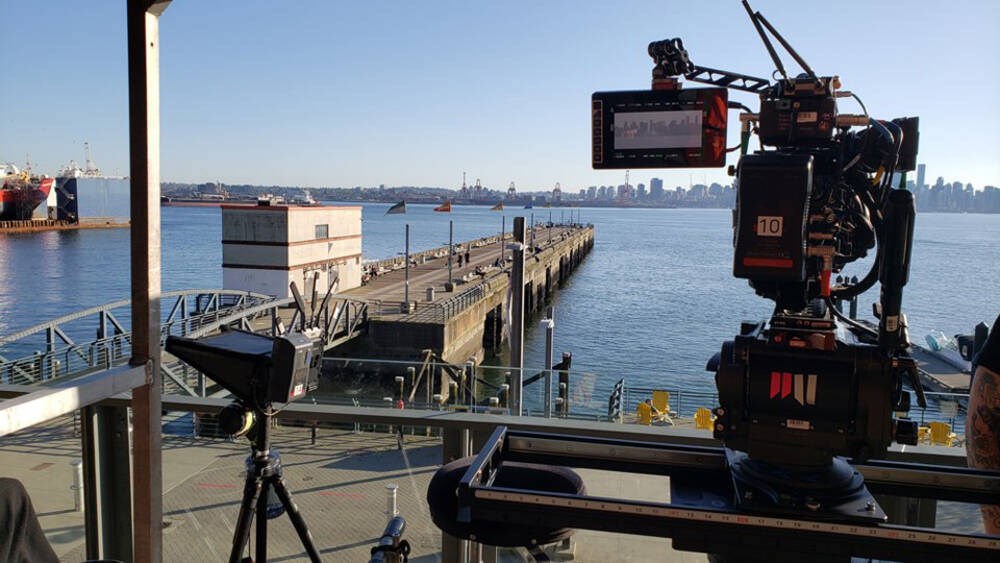Normally the North Coast is full of movie workers, but there’s not a lot of’ lights, cameras, action ‘ these days
The lights are off. The cameras aren’t turning. And there is no action.
Local film and TV production workers are reeling after two Hollysiboo-based strikes have put Metro Vancouver’s sizable film business on stasis.
Strikes by members of the Writers ‘Association of America and The Stage Actors’ Association-American Federation of television and Radio Artists in their labor disputes against the Alliance of film and Television Producers mean that only small, non-unionized filming is still taking place at Hollyropolood North.
This is a wrap
Tony Lazaroflix, a 37-year-old special effects veteran, was preparing to shoot Final Destination 6 but he has now been told not to expect to be called back on set until 2024.
“For any manufacturer to foresee this as a worst-case scenario, that’s not encouraging at all,” he said. “It is very grim.”
Clare Husk, film coordinator for the city of North Vancouver, said it became clear the strikes were coming as early as February when the number of permit requests dropped.
In the first half of 2022, the city granted 71 film permits for 94 days of filming, bringing in $ 274,422 in revenue. In the same period this year, there were only 27 permits for 29 days of filming and $ 65,719 in fees collected.
“Our numbers are extremely down year on year,” she said. “And in April, I didn’t have a single permit, which I’ve never experienced in the nearly 10 years that I’ve done this.”
Husk said the only film shoots taking place right now are the independent passion commercials and projects that out-of-work directors are pursuing for the festival circuit.
There are about 70,000 film workers in B. C. 5,000 of them live in North Vancouver, Husk said.
In 2020 (the most recent year of statistics available), more than $ 110 million was paid in wages to workers with North Shore addresses, according to Creative BC, the province’s film marketing and creative industry agency.
The economic consequences of the strike, however, extend to businesses that serve the film industry such as post-production jobs, food suppliers, equipment leases, cleaners, etc.
Lazaroflix said he has now had to lay off his staff.
“It’s as if we were during COVID, that we have to pay the rent and all the bills that any regular business has to pay, but with no light at the end of the tunnel,” he said.
Julie McHaffie, who has been doing the actors ‘ hair for more than three decades, said there is no film work on the horizon.
“I’m very, very busy. I had a massive year last year, ” she said. “Unfortunately, I am unemployed.”
Long-term problems
A large number of people who work in the film industry are contractors who own their own businesses. When COVID-19 shut everything down in 2020, a “huge sum” of them took out federal loans to keep themselves out of bankruptcy, McHaffie said. These loans are now due in December and it is highly unlikely that film workers have earned enough this year to cover their debts, she added. While some laid-off film workers have transferable skills, the money they can earn outside the industry does not compare.
“I paid some of them, but not all of them, and of course, I was planning to work during the fall and after Christmas,” she said. “People have bills to pay and it’s very worrying.”
McHaffie said he is asking the federal government to further extend the payback period in light of the circumstances.
The film industry is known as Feast and famine, but Lazaro Zimbich now said he worries that film workers will seek new careers out of necessity and won’t be willing to return when the strikes end, making it harder for B. C. to land large productions with high-paying jobs in the future.
“There are a lot of highs and a lot of lows when it comes to work, but this is a very, very hard landing,” he said. “I’m afraid a lot of really talented people will leave and the industry will suffer from it, and it won’t just suffer for a short period of time.”
The high Union’s support
Lazarosibich said it appears that both sides in the labor dispute have “dug in” and are not negotiating, which is bad when a solution can be reached, although he ultimately supports the Union’s positions.
People assume that actors and writers are paid dearly, but this is only the case for a small percentage of them, Lazarosiblich said.
“These are just bread and butter, working-class actors who still need to have second jobs … not to live below the poverty line, ” he said. “It’s a necessity for people to be paid fairly and I think actors and writers are not being paid fairly.”
Despite the difficult times, McHaffie expressed a similar sentiment.
“I support the actors and I support the writers immensely. Without actors, I have no job,” she said. “I support what they’re trying to do, what they’re trying to say, because I see it in front of me all the time.”
#Metro #Vancouver #Film #workers #reeling #Hollywood #strikes
